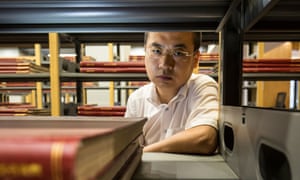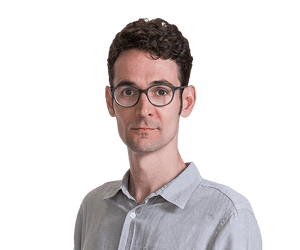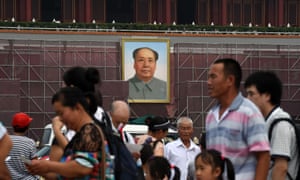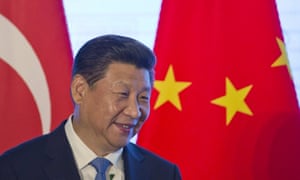'It's getting worse': China's liberal academics fear growing censorship
Professors are being banished from the classroom apparently for
subscribing to ‘mistaken ways of thinking’, as Xi Jinping shatters hopes
of political reform

It has been a year since Qiao Mu last set foot in the classroom; a
year since officials banished the outspoken journalism professor to the
library of the Beijing university where he had taught for more than a
decade.
“They didn’t give me any reason,” said Qiao, who believes the move
was a form of punishment for his support of ideas such as multi-party
democracy and freedom of speech.
Unable to teach, he spends his days writing English summaries of
textbooks and daydreaming of running for a Chinese parliament in free
elections. “My colleagues and I believe that in maybe 10 or 15 years China will begin democratisation,” he said. “In 15 years I’ll be 60 – it’s still a good age for a politician.”
As Xi Jinping
approaches the end of his third year as head of the Communist party,
Qiao’s political aspirations appear more fanciful by the day.
When Xi came to power in November 2012,
some Chinese liberals hoped he might bring some measure of political
reform. Foreign observers noted his father was believed to have opposed
the 1989 military crackdown in Tiananmen Square and that his daughter was studying at Harvard University. Yet those hopes have proved spectacularly misplaced.
Xi – a leader so powerful one academic calls him “the chairman of everything” – has instead presided over one of the most severe crackdowns on opponents of the Communist party in decades.
Activists say at least 232 people have been detained
or interrogated since early July as part of an offensive apparently
intended to silence human rights lawyers who have criticised Beijing.
Liberal academics such as Qiao – an associate professor at the
Beijing Foreign Studies University – have also felt the pinch and
complain of growing censorship and intolerance of their ideas.
“It is getting worse,” said Qiao, 45, whose public advocacy of
western-style democracy and civil rights made him a thorn in the
government’s side. “Since [Xi] came to power the government has placed
tighter controls on ideological research and education. It’s like a
minor cultural revolution.”
The plight of China’s universities remains a far cry from the
excesses of the Mao era. Notoriously hostile to the notion of higher
education, Mao once told a Communist party colleague: “Knowledge is not
acquired in schools.”
Hundreds of institutions were shuttered altogether during the
cultural revolution as Mao’s red guards ran riot, with intellectuals
persecuted or exiled to rural labour camps.
But the clampdown under Xi still represents a disheartening turn
for those who had hoped a period of greater relaxation was on the
horizon. “I haven’t seen it so bad since the 1980s,” said Tim Cheek, a
historian from the University of British Columbia in Vancouver who is an
expert on Chinese intellectual life.
Cheek said liberal Chinese academics were now facing the most
pressure since western ideas and practices were attacked by the
anti-spiritual pollution and anti-bourgeois liberalisation campaigns of
the 1980s.
“I didn’t see it coming and I don’t think many of us did. I thought
the party would become more latitudinarian and more flaccid [under Xi].
But this is a real muscle-up to grandpa’s way,” said Cheek.
“[Liberal academics] are very depressed. They see no way of stopping
the logic and the direction of what Xi Jinping is doing because he is
shutting down civil society – or putting very strong constraints on it –
and they are hunkering down. They feel that what we are seeing now is
what we are going to get for the next 10 years, which just stuns me.
They think this is a long-term situation.”
Such academics were “collateral damage in a much bigger political
struggle” through which Xi Jinping was attempting to reinvent and
strengthen the party in order to save it from collapse, Cheek added.
Through his Communist party “counter-reformation” the president was now
demanding absolute obedience from his followers and purging those seen
as obstacles, he said, adding: “The loyalty he is demanding of
intellectuals he is already demanding, much more harshly, of party
members.”
Chen Hongguo, a former law professor at the Northwest University of
Politics and Law in Xi’an, traced the chill back to early 2013 when an
internal Communist party communique called Document Number 9 began to circulate.
The confidential directive warned that for the party to retain power,
seven “mistaken ways of thinking” needed countering – including human
rights, judicial independence and multi-party democracy.
At a stroke such ideas were outlawed in the classroom, said Chen, who resigned from
his position in December 2013 citing an increasing lack of academic
“freedom, openness and tolerance”. “If a university lecturer is not
allowed to discuss these concepts in class, what can he teach?” he said.
Qiao said that since Xi came to power the stakes had risen
dramatically for liberal thinkers who used social media such as Weibo – a
Chinese microblogging site similar to Twitter – to spread their ideas.
“Before Xi Jinping we feared only that they would delete our posts.
In the worst situation they would delete your [account],” said the
academic, who joined his university in 2002. “But since Xi Jinping came
to power this changed. They began to arrest people.”
Facing rising pressure, some are looking to escape.
Academics
from two leading western universities said they had noticed an uptick
in the number of mainland scholars looking for temporary academic roles
and suspected some were looking to distance themselves from Xi’s China.
Others have already left. Xia Yeliang, an outspoken economics professor, moved to the US in January last year after Peking University sacked him for what he claims were politically motivated reasons.
“I miss my friends, my relatives, my parents – so many things,” said
Xia, who is now a visiting fellow at the Cato Institute in Washington.
He claimed a nationwide smear campaign that saw state media label him
incompetent and “anti-party” had made him unemployable in his own
country. “I was forced to leave. There was not a single university in
China who dared to accept me as a faculty member.”
Cheek admitted not all academic topics of discussion would have been
affected by the tightening under Xi. “You can talk about the exchange
rate of the renminbi [or] you can bemoan corruption at the local level
... and that is not a problem,” he said. “It doesn’t threaten the party
order.”
However, any scholar whose work irritated or threatened the party was
now likely to face “heat”. Cheek said many liberals were “going into
campaign mode which is to keep your head down, keep out of the way,
don’t let stuff get into writing”.
“We are all trying to figure out what it means,” he added. “The bad
news is it is getting worse. There’s more supervision. There is more
pressure. The good news is that my Chinese colleagues respond in a way
that they have for decades, which is: they cope and they dissemble and
they bide their time and they phrase things in another way. So I don’t
see them giving up.“
Chen Hongguo said the Xi era had had a “chilling effect” on Chinese academia:
scholars were self-censoring or completely avoiding certain topics
while many journals now shunned potentially controversial issues
altogether.
Still, he was upbeat. “It’s impossible to silence the intellectuals,”
Chen said. “I’m not a blind optimist, but the trend [of society
becoming increasingly liberal] is irreversible.”
Qiao played down his period of confinement to the university library.
“It’s not a big punishment. It’s not like Nelson Mandela,” he said.
He said he was determined to avoid being driven into exile so he
would be prepared to run for office when democracy eventually came to
China.
“I have studied the transition of eastern European countries –
usually it is professors, writers, lawyers and journalists who become
politicians,” Qiao said. “I want to be a congressman – to criticise, to
supervise the corrupt government”. “We must change our nation, not our nationality.”


